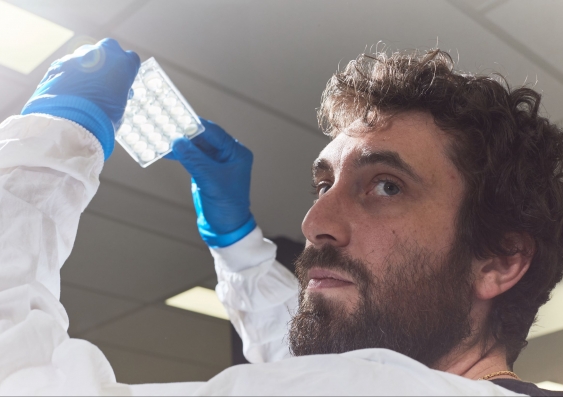UNSW researcher awarded $1.8m international life science grant
A UNSW Sydney researcher has received a prestigious international grant to study the origins of movement in bacteria and its application to present-day biology.
A UNSW Sydney researcher has received a prestigious international grant to study the origins of movement in bacteria and its application to present-day biology.

Scientia Senior Lecturer Dr Matthew Baker has been awarded a 2021 Human Frontier Science Program (HFSP) Research Grant – Early Career, to experimentally recreate the emergence of bacterial motility and measure the evolutionary constraints which govern gain of function.
The HFSP is a world-leading funding body dedicated to supporting fundamental biological research and promoting intercontinental collaboration. Its research grants are designed to create new approaches for understanding the complex structures and regulatory networks of living organisms, their evolution and interactions. Research teams must span international borders to encourage innovation.
Dr Baker’s $1.8m team grant will be shared with Dr Nick Matzke from Auckland University, Professor Betül Kaçar from the University of Arizona and Dr Luke McNally from Edinburgh University. It’s one of just seven early career grants to be awarded from 158 applications, after a rigorous year-long global selection process, and the only successful Australian-led project.
“I am really deeply honoured to share HFSP funding with my team and the 2021 cohort to follow one of my life's passions – the origins of complex systems – in particular the first swimming of bacteria,” Dr Baker says.
“Most bacteria swim via a tiny nanomachine a thousandth the size of a grain of sand which rotates five times faster than a Formula 1 engine. We hope to understand how this motor first came to rotate.”
Dr Baker’s project How life got moving: reconstructing and re-evolving the bacterial flagellar motor, piece-by-piece aims to estimate what an ancient flagellar motor – the tiny rotating wheel that powers the swimming movement of bacteria – might have looked like, and then re-engineer it for further experimentation and research.
“The bacterial flagellar motor moves bacteria to places where the environment suits them better,” Dr Baker says. “It does this under the control of a sensory system in which receptors on the outside of the bacteria respond to changing nutrient concentrations in its environment.
“By studying the flagellar motor, we've discovered that its building blocks are found in many other bacterial systems, serving functions other than motion – including secretion, and energy storage and release. This allows us to investigate what conditions force the flagellar motor to adapt, and helps us understand how complex nanomachines, like the bacterial flagellar motor, can develop new functions over time.”
Such studies have applications in synthetic biology where we manipulate bacteria in useful ways that can make a difference to people's lives, especially in healthcare.
Dr Baker is based in UNSW Science’s School of Biotechnology & Biomolecular Sciences. He says he’s dreamt of securing HFSP funding for more than 10 years.
“I love the fact that these grants encourage us to work with new partners in new countries to solve difficult problems.”
The HFSP grant will support his team’s research project for three years.